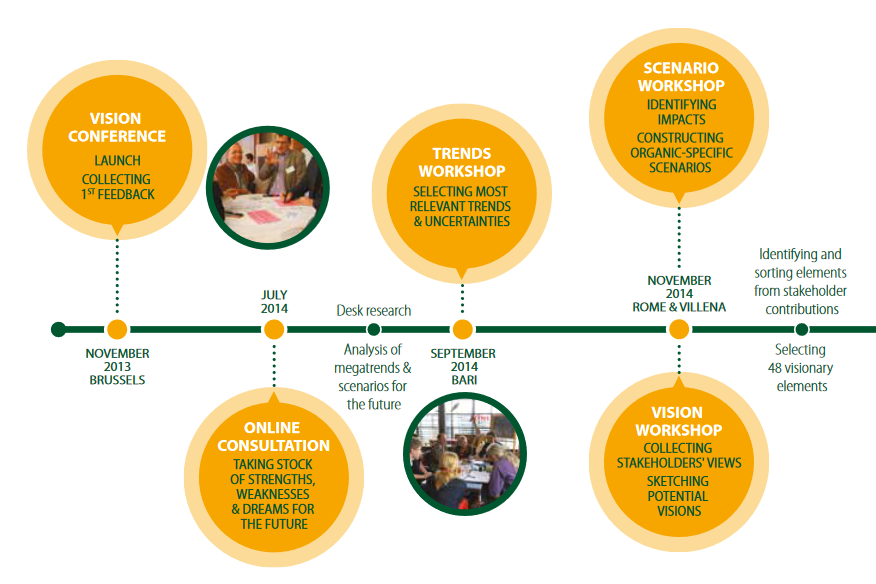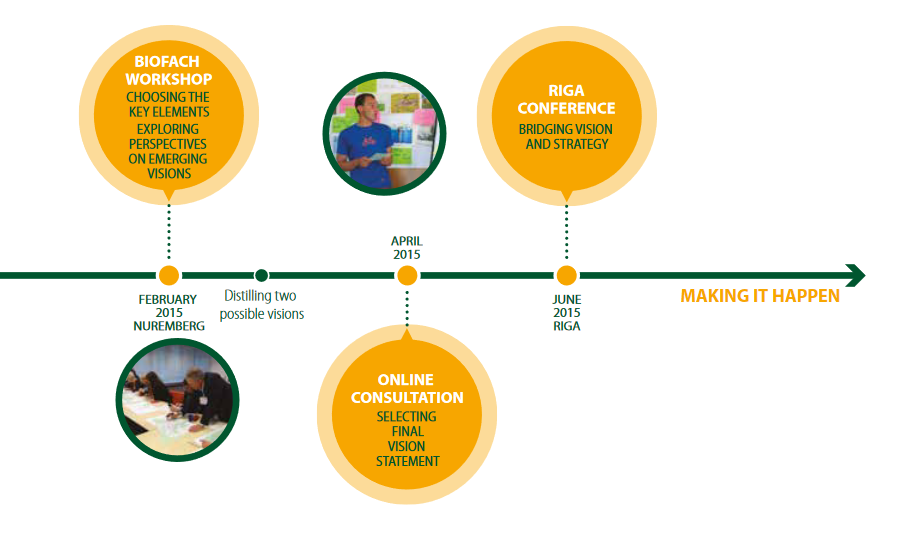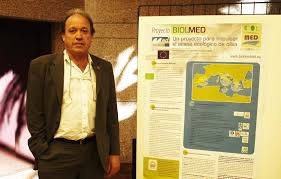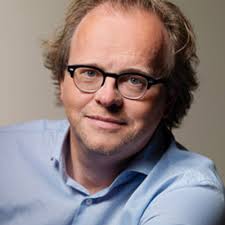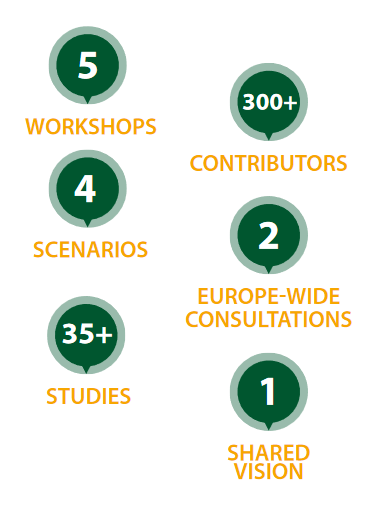Vision 2030 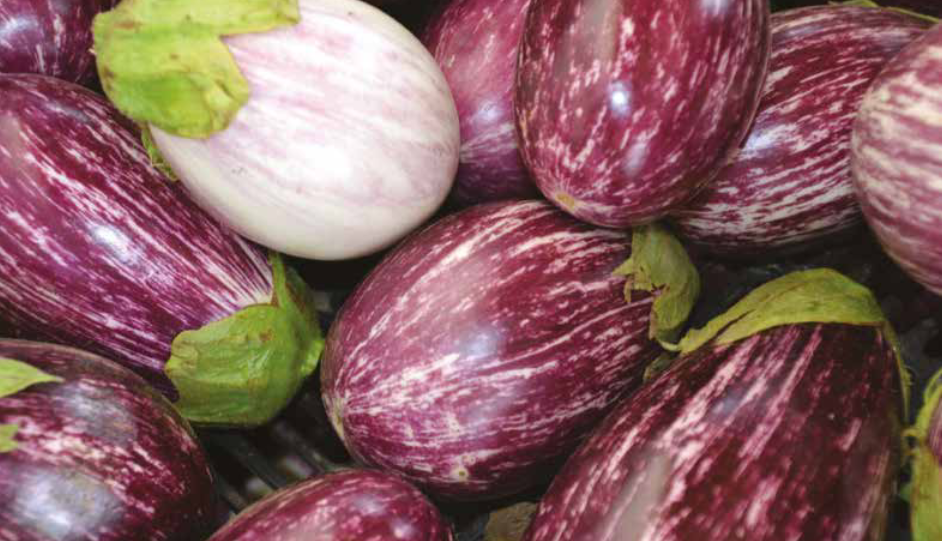
A vision for the future is a shared dream of the world that we want to live in. Making Europe more organic has always been the mission of the movement, the ultimate reason for our existence. Through a strategic conversation in this visioning process, IFOAM EU established what we want to achieve by 2030 in broad terms as a movement and as a sector. The vision that we have arrived at grew out of our aspirations and dreams of a desired future, regardless of current challenges or potential difficulties.
“Vision is the art of seeing the invisible.”
Jonathan Swift
“In 2030, (organic) farmers and processors take agroecology as the scientific and practical basis for the delivery of food and environmental services to society as a whole.”
Víctor Gonzálvez, Spanish Society for Organic Farming (SEAE)
“For me the vision process of the organic movement is about our “why” and who is in power there. Although daily reality demands that we spend our time supplying the organic mainstream, I still believe that bringing our four principles into business reality is the biggest challenge. Daring to be a frontrunner, daring to speak out for societal change, without denying our responsibility to supply the ongoing growing markets.”
Ronald Van Marlen, Member of the Board of the Dutch Organic Processors Association
“My vision for the organic sector in 2030 is to see everybody following the organic way of thinking, having sustainable agriculture means that environmental, social and economic issues are included in the system, ensuring wellbeing for us and for our children.”
Charikleia Minotou, IFOAM AgribioMediterraneo
Our Vision 2030 – Transforming food and farming
Our vision for food and farming is of a fair, environmentally conscious, healthy and caring system widely adopted in Europe. The European organic movement continues to lead change, believes in holistic approaches and thrives on interactions with other like-minded initiatives, including fair trade, agroecology and urban agriculture.
Driven by the support of citizens and by building bridges with other stakeholders in the food and farming system, we are committed to achieving more than half of Europe’s agricultural land managed according to organic principles of health, fairness, ecology and care, providing fresh, seasonal, fairly priced as well as minimally and carefully processed organic food to every European home, workplace and institution.
The European organic movement stimulates and rewards the further development of organic systems, improving the resilience and environmental performance of organic production systems, while innovative tools for upholding the integrity of the supply chain promote trust. Policy makers and citizens widely recognise and value the contribution of organic farming to the delivery and support of vital ecosystem services to society.
As we move forward towards our goal of being a model for sustainable farming and food systems, we support a culture of innovation based on holistic principles leading to more resilient and productive farming systems, greater biodiversity, better food quality, more appropriate processing and fairer supply chains. New and indigenous, locally adapted varieties and breeds suited to organic farming practices and local conditions are encouraged and preserved. Farm animals are healthy, live in stress-free conditions and contribute to the sustainability of organic farms.
European farmers and all workers in the organic supply chain are fairly remunerated for their contribution to the health of the environment, communities, local and rural economies, and for providing flavourful and abundant food to contribute to the welfare of our planet and the quality of life of all people.
The organic movement works towards a paradigm shift in education and learning to strengthen the connection between environmentally and socially responsible food choices. People reconnect to food production by actively engaging with short supply chains.
What was the vision process like?
Participatory, explorative and insightful – these were the central aspects that we considered at every stage of our vision process, which was launched in November 2013.
Online and offline conversations in the form of surveys, workshops and meetings with over 300 contributors helped us tap into the vast collective knowledge and experience of the organic movement in Europe. Opening up parts of this process to a broader range of stakeholders ensured that we also captured ideas and perspectives of brilliant minds beyond the organic sector.
To explore crucial issues and future challenges that the movement will face, we created spaces for deeper, small-group discussions in multiple locations throughout Europe – Brussels, Bari, Rome, Villena and Nuremberg.
With the help of an extensive review of current foresight studies and contributions from experts, it was possible to build scenarios of plausible futures and ground our visions in reality.
In the final phase of distilling a shared vision, we worked through over 300 visionary elements collected from multiple sources at the various stages of the process. We then further reduced them into a set of 48 elements covering diverse aspects from value chain interactions to production methods and certification. A number of stakeholders of varied backgrounds sorted through and discussed the final set of visionary elements at the BioFach vision workshop. Statistical analysis revealed which of the elements the workshop participants agreed upon, forming two distinct – though not too diverging – viewpoints on how the future of the organic movement should be. These two vision statements were then opened up to a Europe-wide consultation in the final phase of the vision process. The public consultation helped sharpen the final vision and highlight our priority areas for the future.
The resulting vision statement represents the ambition of the organic movement to lead the change in the European food and farming sector. The very essence of this statement is that, no matter how challenging the circumstances prove to be, the underlying values of the organic movement will play a pivotal role in shaping the future of Europe’s most innovative food and farming sector.
Figure2: Developing a vision for the European organic movement
